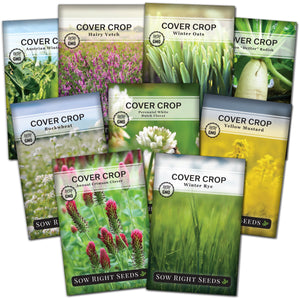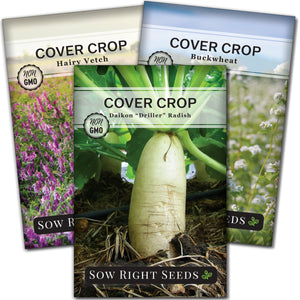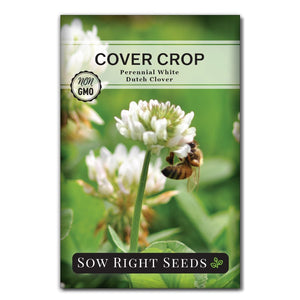White Dutch Clover Cover Crop: The Easy Way to Create Better Soil
Cover crop growing tipsYour soil is the foundation of your garden, and keeping it healthy and rich will lead to healthier plants that take a lot less work. One of the easiest ways to enrich your soil is by using cover crops. Cover crops reduce soil erosion, add nutrients, and protect your garden from the invasion of weeds during times when that area isn’t being used. When trying to choose the right cover crop for your garden, White Dutch Clover is a versatile, easy-to-grow perennial that has a lot to offer.

Benefits of White Dutch Clover as a Cover Crop
White Dutch clover is a low-growing, perennial legume that’s a popular choice because it is very compatible with grass lawns, blending into the greenery. It’s also well-suited to raised beds and garden paths. It has a number of benefits that make it an excellent choice for any gardener:
- Nitrogen fixation: All legumes fix nitrogen from the air and “fix it” into the soil, converting it into a usable form that plants can access through their root systems. Planting clover as part of your crop rotation will increase the amount of nitrogen in your soil and decrease the amount of fertilizer you will have to add for other plants.
- Ease of growing: White Dutch clover is a hardy plant that can grow in a variety of soil types and conditions and requires very little care or upkeep after being planted. It is well suited for growing in heavy clay soils and can handle wet seasons as well as drought conditions.
- Fast growing: Germination takes only about a week, and the plants establish very quickly.
- Durability: Clover is fairly resistant to pests and diseases. It can also withstand foot traffic and dog urine!
- Year-round protection: Although it’s best to sow in spring or fall, White Dutch Clover can be grown any time of year, thanks to its tolerance to both heat and cold.
- Weed suppression: Clover covers the soil quickly, forming a dense mat that suppresses weeds while it is protecting and enriching the soil.
- Prevents soil erosion: Those dense roots hold soil in place and keep it from washing or blowing away.
- Pollinator-friendly: Bees especially love clover, but other beneficial pollinators will also visit these nectar-rich flowers.
How to Plant White Clover as a Cover Crop
Growing White Dutch Clover in your garden is very easy. Clover seeds can be planted in fall or spring.
- For fall planting of White Dutch Clover, allow at least 40 days before the first frost. This will give the plants time to put down roots and become established.
- Plant clover by sprinkling the seeds directly into your raised beds or garden paths. Seeds can be covered to a depth of 1/4".
- White clover seeds germinate in 7 to 14 days.
- Keep the soil moist until the clover plants are established. Once they are growing well, you can mow or trim white clover periodically to keep it at a manageable height.
- If you decide you no longer need the cover crop, you can simply till it into the soil to add organic matter and nutrients.
- For maximum nitrogen fixation, wait until the clover has flowered to till it under.

White Clover as a Ground Cover or Lawn
If you want an easy-to-maintain ground cover, grow White Dutch Clover. White clover can be used alone as a ground cover or mixed with lawn grasses. It fixes nitrogen in the soil and increases biodiversity.
Clover is a perennial and is drought-resistant. It will die back in cold winters and leave a bare spot but regrow in spring, so you may want to mix it with grass seed for a green lawn over winter.
Another benefit of adding white clover as a ground covering is that you won't have to fertilize it. Clover is also pet-safe and won't be harmed by dog urine.
White Dutch Clover FAQs
Do rabbits and deer eat white dutch clover?
Yes. This tasty plant will attract deer and rabbits and is often planted as a forage crop for grazing animals.
Does White Dutch Clover spread?
White Dutch Clover can spread and reseed if left to grow as a perennial.
If you’re stuck on a cover crop for your garden, White Dutch Clover is an excellent choice for almost any situation. It’s a beginner-friendly choice, thanks to its versatility and ease of growing, but it also provides some serious benefits for any garden. So why not give it a try and see for yourself? Your garden will thank you!









Leave a comment